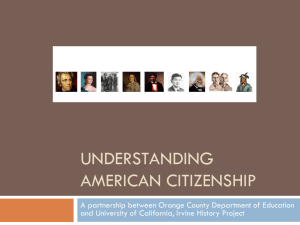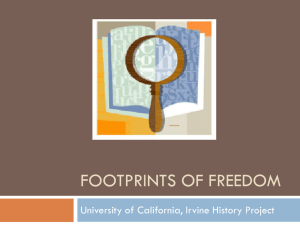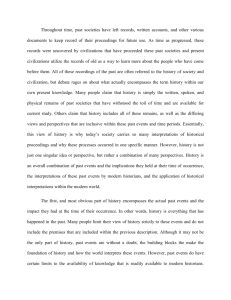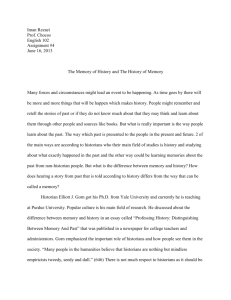Student Worksheet
advertisement
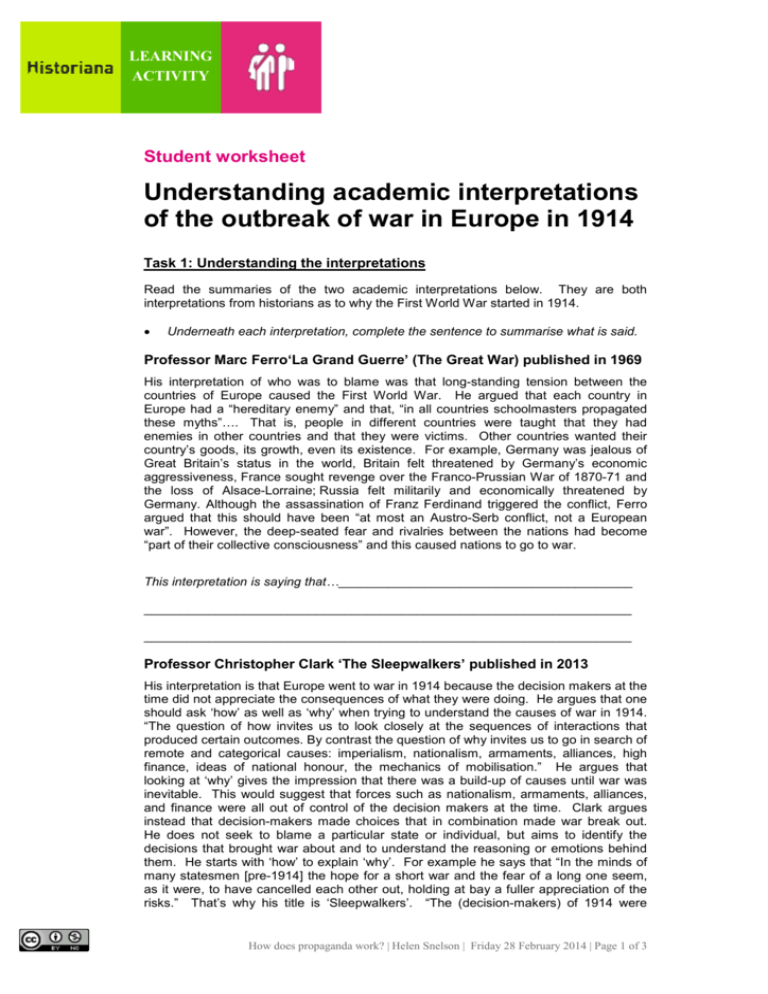
LEARNING ACTIVITY Student worksheet Understanding academic interpretations of the outbreak of war in Europe in 1914 Task 1: Understanding the interpretations Read the summaries of the two academic interpretations below. They are both interpretations from historians as to why the First World War started in 1914. Underneath each interpretation, complete the sentence to summarise what is said. Professor Marc Ferro‘La Grand Guerre’ (The Great War) published in 1969 His interpretation of who was to blame was that long-standing tension between the countries of Europe caused the First World War. He argued that each country in Europe had a “hereditary enemy” and that, “in all countries schoolmasters propagated these myths”…. That is, people in different countries were taught that they had enemies in other countries and that they were victims. Other countries wanted their country’s goods, its growth, even its existence. For example, Germany was jealous of Great Britain’s status in the world, Britain felt threatened by Germany’s economic aggressiveness, France sought revenge over the Franco-Prussian War of 1870-71 and the loss of Alsace-Lorraine; Russia felt militarily and economically threatened by Germany. Although the assassination of Franz Ferdinand triggered the conflict, Ferro argued that this should have been “at most an Austro-Serb conflict, not a European war”. However, the deep-seated fear and rivalries between the nations had become “part of their collective consciousness” and this caused nations to go to war. This interpretation is saying that…_________________________________________ ____________________________________________________________________ ____________________________________________________________________ Professor Christopher Clark ‘The Sleepwalkers’ published in 2013 His interpretation is that Europe went to war in 1914 because the decision makers at the time did not appreciate the consequences of what they were doing. He argues that one should ask ‘how’ as well as ‘why’ when trying to understand the causes of war in 1914. “The question of how invites us to look closely at the sequences of interactions that produced certain outcomes. By contrast the question of why invites us to go in search of remote and categorical causes: imperialism, nationalism, armaments, alliances, high finance, ideas of national honour, the mechanics of mobilisation.” He argues that looking at ‘why’ gives the impression that there was a build-up of causes until war was inevitable. This would suggest that forces such as nationalism, armaments, alliances, and finance were all out of control of the decision makers at the time. Clark argues instead that decision-makers made choices that in combination made war break out. He does not seek to blame a particular state or individual, but aims to identify the decisions that brought war about and to understand the reasoning or emotions behind them. He starts with ‘how’ to explain ‘why’. For example he says that “In the minds of many statesmen [pre-1914] the hope for a short war and the fear of a long one seem, as it were, to have cancelled each other out, holding at bay a fuller appreciation of the risks.” That’s why his title is ‘Sleepwalkers’. “The (decision-makers) of 1914 were How does propaganda work? | Helen Snelson | Friday 28 February 2014 | Page 1 of 3 LEARNING ACTIVITY sleepwalkers, watchful but unseeing, haunted by dreams, yet blind to the reality of the horror they were about to bring into the world.” This interpretation is saying that…_________________________________________ ____________________________________________________________________ ____________________________________________________________________ Task 2 – contrasting the interpretations Both of these historians’ have examined the source material as evidence and arrived at different interpretations as to why war started in 1914. Find three differences between the sources and write them here: 1. ____________________________________________________________________ 2. ____________________________________________________________________ 3. ____________________________________________________________________ Task 3 – why do historians arrive at different interpretations? Historians work with source material and use it as evidence to put together their interpretations. A good historian is someone who is always attempting to uncover the truth, and who shows clearly how their interpretations are based upon use of source material as evidence. However, source material can often be interpreted in different ways and debate is the life-blood of the discipline of history. Below are a series of statements. Put a tick by the one(s) that you think is most likely to be true in this case: o These interpretations are so different because: o They are written at different times. o The historians come from different countries. o The historians have different views about how change happens. o One of the historians is bad at his job. o The historians have asked different questions of the source material. Discuss your thoughts with a partner. Task 4 – How can a knowledge of the historians’ backgrounds help us to explain their contrasting interpretations? Read the information about the backgrounds to these two historians and discuss with a partner how the historians’ backgrounds may have shaped the interpretations of the causes of war in 1914 that they have written. Marc Ferro is a member of the Annales School of historians This way of thinking about history was developed in the second quarter of the 20th century and has impacted upon the study of history today. It was pioneering because it How does propaganda work? | Helen Snelson | Friday 28 February 2014 | Page 2 of 3 LEARNING ACTIVITY insisted upon the study of history using approaches from subjects such as geography and sociology. History was not just to be about politics and high diplomacy, but was to consider long-term changes in all levels of society. Supporters of the Annales approach see events as less important than the mental frameworks (the world of ideas and assumptions) that shaped decisions and practices. Little attention is paid by the Annales historians to political, diplomatic, or military history, or to biographies of famous men. Instead the Annales focuses upon historical patterns in social, economic, and cultural history, statistics, medical reports, family studies, and even psychoanalysis. Christopher Clark is a historian at the University of Cambridge Clark was born in Australia, where he did his first history degree. He then lived in West Berlin just before the reunification of Germany and studied at the Freie Universität Berlin. He did his PHd at Cambridge University and became Professor of Modern European History there. His research interests are centred on the history of nineteenthcentury Germany and continental Europe. In the London Review of Books (5 December 2013) the reviewer describes ‘Sleepwalkers as “ a history for its – that is, our – times, “ starting, as it does with an act of terrorism. Clark does not subscribe to a particular school of history, though he works at the centre of academic work into the history of modern Europe. Task 5 – drawing your thoughts together Now write a short paragraph to show what you have learnt today. Write this paragraph to explain to someone who has not done the work: Which two academic historians’ work you have studied and what they have written about. How their interpretations of the reasons for war in 1914 are different. Reasons why their interpretations are different. How you could become better informed so that you could make your own evidencebased judgement about which interpretation you prefer. How does propaganda work? | Helen Snelson | Friday 28 February 2014 | Page 3 of 3
